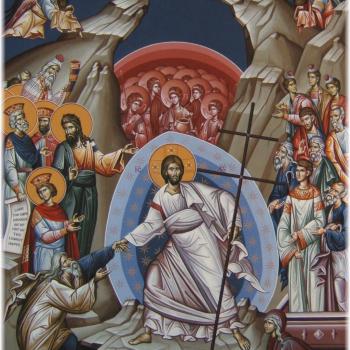36While they were talking about this, Jesus himself stood among them and said to them, ‘Peace be with you.’ 37They were startled and terrified, and thought that they were seeing a ghost. 38He said to them, ‘Why are you frightened, and why do doubts arise in your hearts? 39Look at my hands and my feet; see that it is I myself. Touch me and see; for a ghost does not have flesh and bones as you see that I have.’ 40And when he had said this, he showed them his hands and his feet. 41While in their joy they were disbelieving and still wondering, he said to them, ‘Have you anything here to eat?’ 42They gave him a piece of broiled fish, 43and he took it and ate in their presence.
44Then he said to them, ‘These are my words that I spoke to you while I was still with you—that everything written about me in the law of Moses, the prophets, and the psalms must be fulfilled.’ 45Then he opened their minds to understand the scriptures, 46and he said to them, ‘Thus it is written, that the Messiah is to suffer and to rise from the dead on the third day, 47and that repentance and forgiveness of sins is to be proclaimed in his name to all nations, beginning from Jerusalem. 48You are witnesses of these things. (Luke 24:36-48, NRSV)
An dear friend of mine, who is a retired Episcopal priest, tells this story:
In my first year in a new cure quite a few years ago, I preached the actuality of the Resurrection at all the services of Easter Day. A woman who was a pillar of the congregation and a former vestry member accosted me after the principal liturgy (during the Sacred Shaking of Hands) and said (in a voice which carried), “Well, if THAT’S the sort of thing you are going to preach, this is the LAST you will see of me.” She must have been a prophet, he said, since that’s exactly what happened.
Of course, the actuality of the Resurrection – as fact – as bodily – as recognizably the presence of Jesus — is exactly what the Gospel reading from Luke describes.
There cannot be any other explanation for the invitation Jesus makes to look him over from head to foot. No other explanation for the invitation to examine his wounds. No other explanation for his demonstration that he could consume a bit of day-old fish. And no other explanation for the contrast he draws between the state of his body and the character of ghosts.
You can play all you like with theories about what the disciples experienced – and scholars have played those games. You can argue that the Resurrection is a metaphor for newness or inspiration. You can argue that the Resurrection was the product of a mass hallucination or a conspiracy hatched by the disciples.
But these verses from Luke’s Gospel makes this much clear:
- The disciples did not think of the Resurrection as a metaphor or hallucination.
- If they conspired to hide the body of Jesus, they somehow hid that plot from the storyline of the Gospels over most of a century.
- And if they did that, they did it at considerable expense to themselves in the days and years ahead, suffering martyrdom as a result.
In other words, when we read the Gospel accounts, there are really only three choices that make any sense: They were telling the truth. They were lying. Or they were deluded. And whatever one concludes, there are only two actionable positions to take: the Resurrection happened or (whatever the explanation) it didn’t.
Now, there are some powerful reasons to suggest that neither a mass delusion nor a conspiracy to hide the body of Jesus are at all likely. But, in my experience, it isn’t the weight of historical probability that shapes the opinion of most people.
More often than not, people either believe the Resurrection didn’t happened or it did — because they are materialists, or they are not. What I mean by this is that people who believe that the Resurrection was not possible believe it wasn’t possible because we don’t experience it in our day to day lives. And those who do believe that the Resurrection is possible acknowledge that there are realities that govern life which lie beyond our sensory experiences.
Now, there is no “proving” that the Resurrection happened – not in the sense of an experiment that can be tried, again and again. And Christians need to acknowledge that fact.
But those who argue that the Resurrection didn’t happen should acknowledge that they can’t prove that it didn’t. In fact, the problem for people who don’t believe in the possibility of the Resurrection is that there is a great deal they do believe in that they can’t justify on the basis of sensory experience.
One is the existence of love. One might argue that we experience love or that we see the evidence of love in our world every day. But that is an inference from certain behaviors that begins with the assumption that there is such a thing as love/ But love is entirely immaterial. It can’t be detected or measured by any mechanism we have. It would make more sense to argue on the materialistic grounds that we have experiences of other human beings that is entirely the result of evolution, as well as biochemical and electrical impulses and that we label those impulses as love out of deep psychological need.
The existence of values is a second problem for materialists. For Christians, justice, truth, mercy, love — and any number of other virtues –originate from God, who is the perfect expression of those virtues. But for a true materialist, they are simply evolutionary and sociological conventions that have taken shape in a fairly arbitrary fashion, in order to grease the wheels of evolution.
In fact, a thoroughly honest materialist would grant that those values have no independent existence of their own and will evaporate one day with the implosion of our solar system, and — in the meantime — entropy and death will claim everything in its wake. And, in fact, the ones who are honest about this argue that love and values of every kind are no more than the result of billions of years of evolution. The truth, then, is that the materialist world view is a nihilistic world view and there is no getting around it.
Human love, virtue, sacrifice, and achievement are – at best – an exercise in futility. And even those notions are projections on an otherwise meaningless existence, concocted by our psyches to avoid losing our minds.
What a materialist or an atheist does with this reality is telling. Most of the new atheists continue to insist that life can be about virtue, giving, and sacrifice. But their explanation for why these things exist, founders on the fact that there is nothing in the world greater than ourselves that exists or survives. Friedrich Nietzsche, the nineteenth century philosopher, who was the first to name this trend was also probably the most honest about the result. All we have left is to exercise our drive to live, what he described as the “will to power”.
But the emptiness of the materialist option begins to explain why the Resurrection is central – even indispensable – to the Christian tradition, regardless of what grumpy old grand dames and skeptics might say. You see, the Resurrection is not just about what happens to us when we die. As important as that might be to us, the Resurrection is far more significant.
Because the validity of the church’s claims and the validity of the claims that Jesus made – all depend upon the fact of the Resurrection. The Resurrection is God’s “yes” to those claims. The Resurrection is the game-changer, the watershed, the decisive intervention on which the fate of all creation turns.
It is also the affirmation of what the Hebrew Bible or what we call the Old Testament promises over and over again: You see, bottom line, the Resurrection is not some isolated notion of what happens to us when we die and everything else religious blather about what we do in the meantime. It lies at the turning point in the basic plot line of life itself.
And that plot is this: Our lives and our world are God’s good gift, but that good gift is imperiled by its distance from God. Nonetheless, God will heal us and our world. And he has done that in the person of his Son who has closed that distance by entering into our lives. But it is the Resurrection on which that healing depends.
Put another way: The Christian faith, rightly understood, does not diminish the importance of any soul. It does not abandon creation to fend for itself. It does not leave us to fend for ourselves in the vast darkness of space. It does not leave us with values that ground our existence in popular opinion or random selection. It invests transcendent significance in both ourselves and our world, because both are God’s much-loved creation. But the Resurrection is both the vanguard and the reassurance that this is all true. Far more than a promise about the nature of our eternal destiny, it is God’s verdict on the whole of history.
What a powerful promise in a time of so much turmoil. At a time when our institutions struggle to hold the course. When leaders on every side bicker and name call. When our world is divided by war and teeters on the verge of still more conflict. When the state of the world can make older adults soul sick for the certainties of past conflicts, and younger adults can wonder how we got here.
May Christ’s church claim the promise of the Resurrection. As Dorothy Sayers put it, let our prayer be this: “Fill us with [your] Holy [Spirit], that is the breath of life, for our false gods are sick and dying and for them there is no resurrection.”













